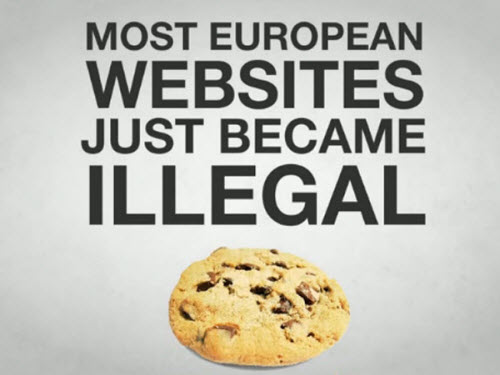Speaking honestly the recent Cookie Law by United Kingdom is right hash-up from start to finish. Now let us find out from start to finish what is this EU Cookie Law.
In recent few months you may have noticed “cookie settings” warning from websites that it uses cookies. The warning has been also seen from high-profile U.K. websites that they are using cookies such as text-size preferences, login function, adverts, or shopping carts.

What is EU cookie law or UK cookie law?
The “e-Privacy” Directive of EU first came into force in the year 2002, and in 2009 it was amended. By this time in 2011 all the twenty-seven EU member states were told of bringing down the Directive into the law of their own member state, which is also applicable for the United Kingdom.
From May 26, 2011 the amended Privacy and Electronic Communication Regulations (PECR) Act 2011 of United Kingdom came into force that states all the companies operating in the UK or EU must obtain consent from the users of its website.
Cookies on any website allow it to offer more personalized experience to the users visiting the website. It also tracks the behavior of users as well as allows owners of the website in tracking performance of the website with non-personal user information.
Some websites have implemented a system of informing its users and also give them option of opting-out the cookies part, but most UK government websites are still not ready for this and fall foul of the law.
According to the Directive, all the websites in EU must make their users aware of the kind of cookies used in the websites.
Is cookies just small part of online tracking?
Yes, but the EU Directive is also targeting “non-essential tracking” even if a cookie is not involved into it. Under this now the website owners need to determine whether the third-party trackers are used on the websites. It is revealed that about forty percent of tracking activity is not cookie related.
Why United Kingdom a year behind everyone else?
Estonia and Denmark met the deadline. UK came close but not more than a D+ for effort. A twelve-month reprieve has been given to UK companies by Information Commissioner’s Office (ICO), an agency of UK data protection.
What you mean by “visitor’s consent”?
In usual cases a pop-up kind of box appears on the website asking its user for either ticking on a box or hitting a button to give explicit consent whether to go ahead with the cookies or other tracking tools. Also, the website users can also be able to determine the cookie level.
Few days before the May 26 deadline there originated a problem. ICO updated guidance further stating “implied consent” will suffice, which is of course against the original Directive of the EU. It has shifted the consent responsibility to the website users and not on the website owners.
My options in accepting or declining cookies
An example from the BT case, the UK broadband company, indicates that users need to pick between strictly necessary cookies and functional cookies as the first one is necessary for sites to simply work. But as all the websites and apps are different these days, there is no single solution to it. Some websites offer implied consent.
Are US-based companies with EU, UK presence affected?
No. You are not liable.
What penalty is there failing to comply?
Right now there is no penalty as such, but the ICO can issue some fines to the owners of website breaching the privacy laws and it can be around $780,000. However, the ICO said it won’t launch a torrent of enforcement action.
Are mobile app developers affected?
Of course. All the downloadable applications from app stores are subject to this law. ICO has said of examining stores such as Google Play, Apple’s App Store or the Windows Phone Marketplace closely to ensure compliance. Any in-built tracking code will be affected.
Even website analytics are affected?
The new law need to accommodate these but there is no option for EU to outlaw right now. So it is the owner of the website or developer of the app who are required to inform the users.
Most of the cookies are for advertisements as it keeps the Web free
Yes, very true. The Financial Times reported that over 2/3rd of cookies are for advertisements and it keeps the Web vastly free. One major concern here is that if users does not accept the cookies, many site owners will lose money as the ads will not be displayed.
What ICO is doing amid all these confusions?
The ICO is working closely in finding a way out of it. It is chasing fifty big companies in UK in a bid to set a good example. It has contacted Amazon, Google, Facebook etc. to remind about the compliance with new law.

Speak Your Mind